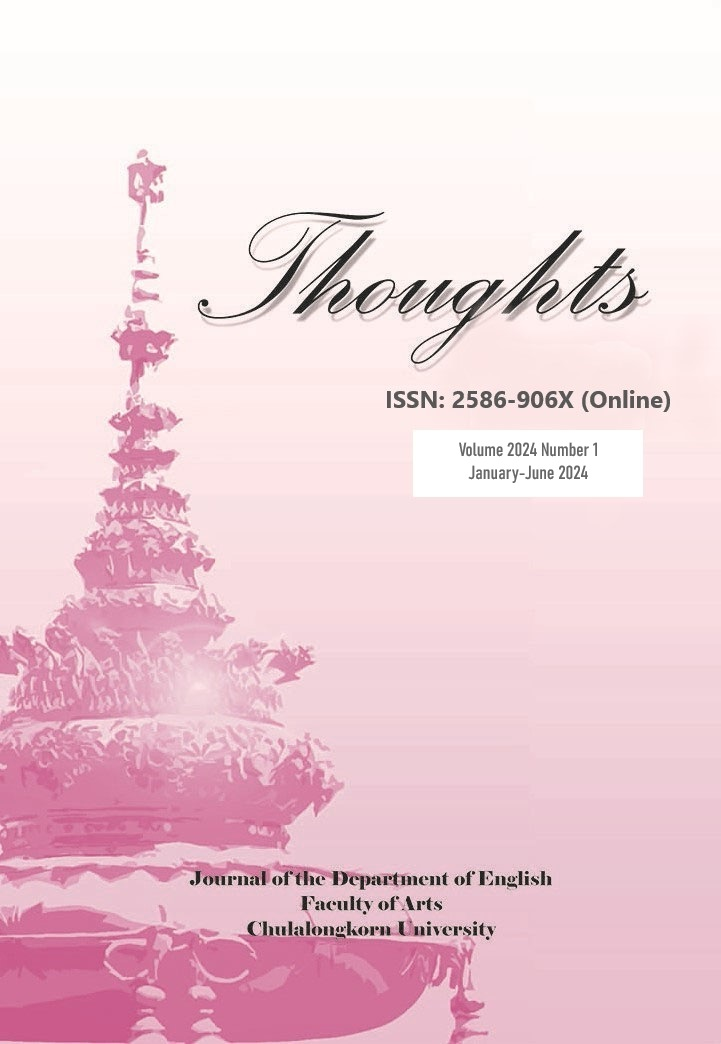It’s about Empathy and So Much More: Fellow Feeling as Sensibility Capital in Graphic Narratives about Healthcare Workers
DOI:
https://doi.org/10.58837/CHULA.THTS.2024.1.4Keywords:
empathy; graphic medicine; graphic novelsAbstract
This article examines graphic novels whose stories revolve around the experiences of healthcare professionals. Paying attention to their themes, plot trajectories and visual elements, it discusses and reflects on the discourses surrounding the concept of empathy through a Marxian lens. My reading accentuates the view that empathy should be regarded as a resource that can be exhausted, involves cognitive/affective costs and thereby requires structural support so that the empathy-driven approach of caregiving can be sustainably maintained.
References
Berlant, L. G. (2011). Cruel optimism. Duke University Press.
Bleakley, A. (2014). Towards a “critical medical humanities.” In V. Bates, A. Bleakley, & S. Goodman (Eds), Medicine, health, and the arts: Approaches to the medical humanities (pp. 17-26). Routledge.
Bleakley, A. (2020). Introduction: The medical humanities—A mixed weather front on a global scale. In A. Bleakley (Ed), Routledge handbook of the medical humanities (pp. 1-28). Routledge.
Bloom, P. (2017). Empathy and its discontents. Trends in Cognitive Sciences, 21(1), 24-31. https://doi.org/10.1016/j.tics.2016.11.004
Butler, J. (2022). The public futures of the humanities. Daedalus, 151(3), 40–53.
Cameron, C. D., Hutcherson, C. A., Ferguson, A. M., Scheffer, J. A., Hadjiandreou, E., & Inzlicht, M. (2019). Empathy is hard work: People choose to avoid empathy because of its cognitive costs. Journal of Experimental Psychology: General, 148(6), 962–976. https://doi.org/10.1037/xge0000595
Charon, R. (2006). Narrative medicine: Honoring the stories of illness. Oxford University Press.
Czerwiec, M. (2017). Taking turns: Stories from Hiv/Aids care unit 371. The Pennsylvania State University Press.
Czerwiec, M., Williams, I., Squier, S. M., Green, M. J., Myers, K. R., & Smith, S. T. (2015). Graphic medicine manifesto. The Pennsylvania State University Press.
Drnaso, N. (2018). Sabrina. Granta Books.
Foley, B. (2019). Marxist literary criticism today. Pluto Press.
Green, M. J. (2015). Graphic storytelling and medical narrative: The use of comics in medical education. In M. Czerwiec, I. Williams, S. M. Squier, M. J. Green, K. R. Myers, & S. T. Smith (Eds), Graphic medicine manifesto (pp. 67-86). The Pennsylvania State University Press.
Habegger-Conti, J. (2020). Not reading the signs in Nick Drnaso’s Sabrina. In J. Habegger-Conti & L. M. Johannessen (Eds), Aesthetic apprehensions: Silences and absences in false familiarities (pp. 47-63). Lexington Book.
Hammond, M. M., & Kim, S. J. (2014). Introduction. In M. M. Hammond & S. J. Kim (Eds), Rethinking empathy through literature (pp. 1-18). Routledge.
Jamieson, T. (2019, February 18). Graphic content: Comedy and tragedy in the NHS. Ian Williams on his new graphic novel The Lady Doctor. The Herald. https://www.heraldscotland.com/life_style/arts_ents/17440457. graphic-content-comedy-tragedy-nhs-ian-williams-new-graphic-novel-lady-doctor/
McCloud, S. (1993). Understanding comics: The invisible art. Harper Perennial.
Nussbaum, M. (2010). Not for profit: Why democracy needs the humanities. Princeton University Press.
Oliver, A. (2017, April 28). “I felt that comics could play various roles within the theatre of healthcare” – Ian Williams on comics as social activism and the Birth of graphic medicine. Broken Frontiers. Retrieved December 15, 2023 from https://www.brokenfrontier.com/ian-williams-myriad-bad-doctor-lady-thom-ferrier-graphic-medicine/
Prinz, J. (2011). Against empathy. The Southern Journal of Philosophy, 49(1), 214-233.
Saji, S. & Venkatesan, S. (2022). Metaphors of mental illness in graphic medicine. Routledge.
Sedgwick, E. K. (2003). Touching feeling. Duke University Press.
Venkatesan, S., & Ancy A., L. (2021). Changing configurations in the portrayal of doctors in graphic narratives: A study of The Bad Doctor and The Lady Doctor. SAGE Open, 11(3), 1-10. https://doi.org/10.1177/ 21582440211036114
Venkatesan, S., & Peter, A. M. (2019). Towards a theory of graphic medicine. Rupkatha Journal on Interdisciplinary Studies in Humanities, 11(2), 1-10. https://dx.doi.org/10.21659/rupkatha.v11n2.08
Whitehead, A. (2014). The medical humanities: A literary perspective. In V. Bates, A. Bleakley, & S. Goodman (Eds), Medicine, health, and the arts: Approaches to the medical humanities (pp. 107-127). Routledge.
Whitehead, A. (2017). Medicine and empathy in contemporary British fiction: An intervention in medical humanities. Edinburgh University Press.
Williams, I. (2014a). The bad doctor: The troubled life and times of Dr Iwan James. Myriad Editions.
Williams, I. (2014b). Graphic medicine: The portrayal of illness in underground and autobiographical comics. In V. Bates, A. Bleakley, & S. Goodman (Eds), Medicine, health, and the arts: Approaches to the medical humanities (pp. 64-84). Routledge.
Williams, I. (2019). The lady doctor. Myriad Editions.
Downloads
Published
Issue
Section
License

This work is licensed under a Creative Commons Attribution-NonCommercial-NoDerivatives 4.0 International License.
Copyright by the Faculty of Arts, Chulalongkorn University.
Photocopying is allowed for internal, non-commercial use only. Photocopying for other uses or for purposes other than indicated must be permitted in writing from the Faculty of Arts, Chulalongkorn University.
All views or conclusion are those of the authors of the articles and not necessarily those of the publisher or the editorial staff.


